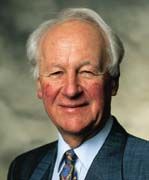 John Stott (1921-2011) has died. Like countless other Christians I mourn his passing. An internationally-respected British Anglican, he was a gifted Christian statesman, and a man of humble integrity, warm grace and prodigious gifts. Perhaps best of all, he finished well. We will miss him, and pray that others of comparable (or at least approximate) quality will emerge to take his place. One cause of the disillusionment of our times is the declining number of people who truly deserve respect. We are becoming, in the words of a twentieth-century history of Scotland, a society with No Gods and Precious Few Heroes. But John Stott has been a happy exception.
John Stott (1921-2011) has died. Like countless other Christians I mourn his passing. An internationally-respected British Anglican, he was a gifted Christian statesman, and a man of humble integrity, warm grace and prodigious gifts. Perhaps best of all, he finished well. We will miss him, and pray that others of comparable (or at least approximate) quality will emerge to take his place. One cause of the disillusionment of our times is the declining number of people who truly deserve respect. We are becoming, in the words of a twentieth-century history of Scotland, a society with No Gods and Precious Few Heroes. But John Stott has been a happy exception.
Eloquent tributes, like the one by Tim Stafford in Christianity Today online, are circulating worldwide. I have just a few personal, anecdotal memories of my own.
Back in the 1970s, I attended an Urbana Missionary Conference in Illinois over Christmas break with 18,000 other young evangelicals. On stage John Stott was asked about his sermon preparation methods. In response, he paraphrased the words of an African-American preacher who said: “I read myself full, I think myself clear, I pray myself hot, and then I let go!” That’s always stayed with me and to some extent guided me ever since. And I saw that wisdom demonstrated right here in San Diego a few years ago, when Stott stood beside (not in) the august pulpit of First Presbyterian Church downtown, and held us spellbound for almost an hour as he expounded three pregnant words in the early church’s proclamation: “Jesus Christ [is] Lord!”
I also heard about a young man, a candidate for the Anglican ministry, who was interning with John Stott, and was quite in awe of the great man. One day Stott gave him the draft manuscript of a book Stott had just written, and asked for some constructive criticisms. The young intern was overwhelmed by the honor, but with much alacrity prepared a list of quibbling criticisms and suggestions for revision, and handed it in. To his astonishment, Stott had a revised manuscript ready the next day, with absolutely every one of the young intern’s suggestions incorporated into Stott’s masterful prose.
Stott had an astonishing (and enviable) ability to cut through theological Gordian Knots, to make obscure biblical texts brilliantly clear, and to demonstrate the reasonableness of orthodox Christian beliefs. He brokered truth between the elite huddled up in the academy and the great crowd of thoughtful but ordinary people down below. As far as I know, he was never offered a chair at a British university, though no doubt he would have occupied it with distinction. I have heard this oversight explained thus: he had disqualified himself by committing the unpardonable sin (in the academy’s eyes) of always making himself abundantly clear.
We don’t always think of lifelong bachelors as exemplars of great social intelligence, but this one was. He had a great mind, but he also had that special gift of sensibility. He chided strident evangelicals determined to push the doctrine of a fiery hell that they should never make their confession triumphantly, but humbly and only with tears in their eyes. When he preached on joy, he was quick to clarify that the last thing the world needed was more grinning Christians. A passionate evangelist, he also dared to make public his hope that in the end we may discover a wideness in God’s mercy that extends well beyond the locus of responders to an explicit Gospel invitation.
We evangelical Protestants long ago rejected the notion of “saints” and the bogus qualifications for such of a documented miracle or two. But we still need heroes—still need exemplars of the faith who embody the highest ideals by which we seek to live. The inspiration of John Stott will continue to energize my generation at least. And the good work he set in motion globally will continue well beyond the time of our own imminent obituaries. We thank God upon every remembrance of him.
2 Responses to John Stott Is Dead but Not Forgotten